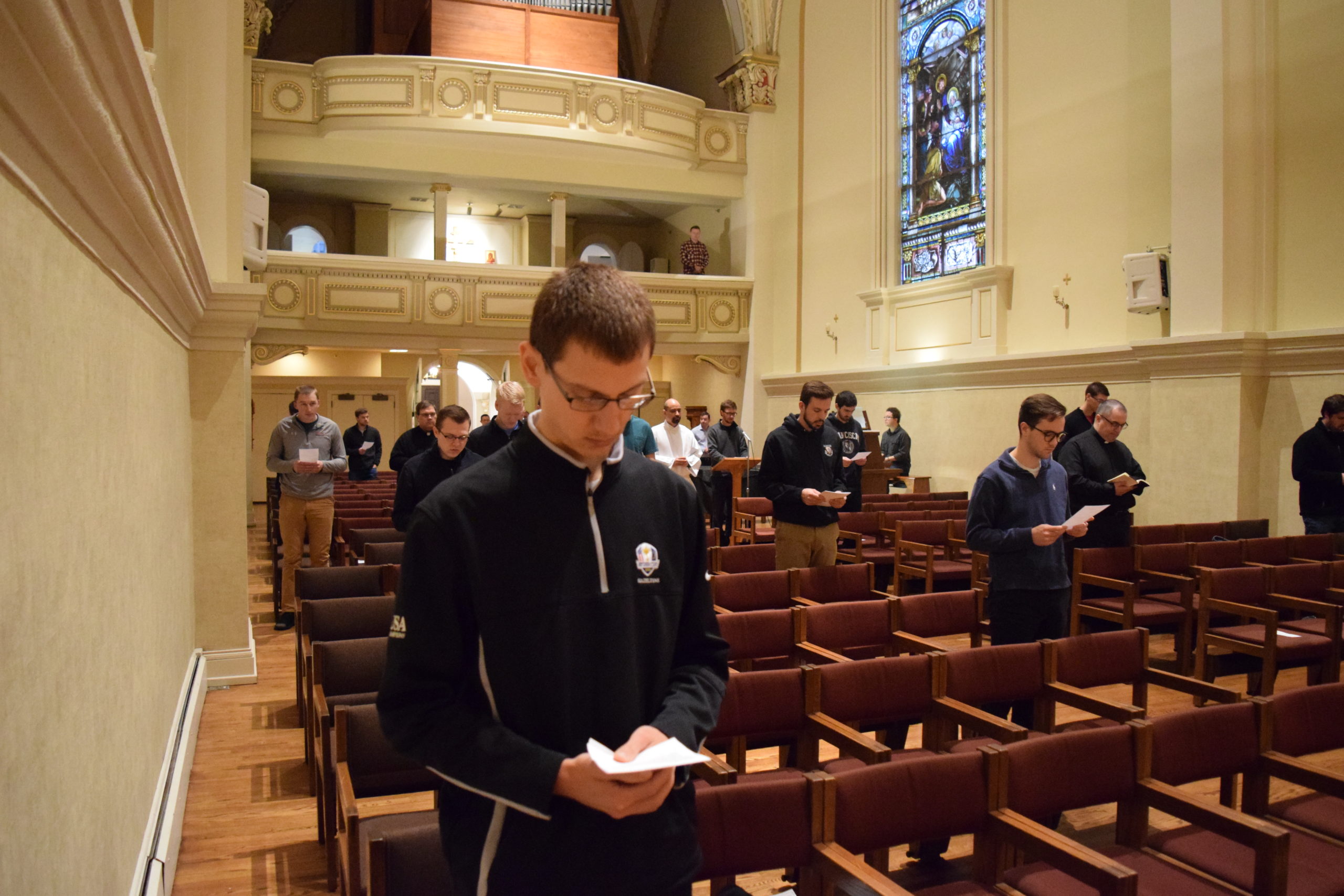Saint Francis de Sales Seminary 175th Anniversary

Seminarians at Saint Francis de Sales Seminary were able to maintain a regular Mass schedule during the coronavirus lockdowns after quarantining. (Photo courtesy of Saint Francis de Sales Seminary)
The closures came like the tumbling of a perfectly spaced row of dominoes. As anxieties mounted in the face of the novel coronavirus throughout the second week of March, schools, churches, workplaces and, yes, even seminaries across the nation made the decision to close their doors.
As Fr. John Hemsing, rector of Saint Francis de Sales Seminary, monitored the situation on the news, he felt compelled to do all he could to keep the seminary open for the 55 men who lived and studied there this spring.
To close the seminary and send the men home, he knew, would halt their priestly formation, probably for the remainder of the semester. They would lose virtually half a year.
Shortly after evening prayer on the Feast of Saint Patrick, with the blessing of Archbishop Jerome E. Listecki and the bishops who sponsor seminarians at Saint Francis (representing the dioceses of Milwaukee, Green Bay, La Crosse, Madison, Superior and Gary, Indiana), Fr. Hemsing informed the men that they had a decision to make: they could return home, or they could stay at the seminary and quarantine for the foreseeable future.
“I was kind of concerned that someone would say I should have sent everyone home, but what would they do at home?” he said. “Here we were — they could be here for prayer, be here for Mass, could take part, in a real way, in the formation sessions here at the seminary. We could do our priestly formation even in the midst of a pandemic.”
Most of the seminarians opted to stay, and as a community they entered into, in Fr. Hemsing’s words, “complete quarantine.”
“After the first 14 days, we didn’t have to worry about social distancing because none of us had it,” he said.
At the same time, the campus made room for returning priests and seminarians who were sent home from the Pontifical North American College in Rome at the end of March. Those returning from Rome were quarantined in Meyer Hall for 14 days to ensure that they had not brought the coronavirus from overseas, and were monitored by public health officials. After those two weeks, with no one exhibiting signs of disease, they joined their brother priests and seminarians in Henni Hall.
With employees of the seminary kept at home by the Safer At Home order, the seminarians and formation faculty took up jobs left behind, trading off the cooking and cleaning duties with an enthusiasm that Fr. Hemsing found admirable.
“I was happy to see that the seminarians stepped forward and really took on positions that other people, hired staff members, usually took care of,” he said. “I really came to realize how dedicated the men who are studying to become priests are — how dedicated they are to their calling and to the service of other people. When we came to this point of, we’ve got to do this together, we’ve got to take care of each other, we’ve got to feed one another and watch out for each other, they really stepped up and did what needed to be done.”
The men also found time to keep morale up, staging an 18-hole mini-golf tournament in Henni Hall and holding a mock Olympic Games. Their academic studies continued virtually through Sacred Heart Seminary School of Theology, while their formation sessions were able to carry on in-person at Saint Francis.
“They really maintained good spirits through it all,” said Fr. Hemsing. “This was really uncharted territory.”
And because the seminarians were quarantined with several ordained priests, they were able to do what the rest of the archdiocese was unable to: maintain a liturgical schedule and attend daily Mass.
“I felt that during this time the seminarians had a special role to play in offering prayers for those who could not attend Mass and receive the sacraments,” wrote seminarian Kevin Harmon in the seminary’s summer newsletter. “Since we could not be physically present to the people of God, we needed to be spiritually present.”
In late March, the seminary collaborated with the Milwaukee Health Department and County Housing Division to transform Clare Hall, on the grounds of Saint Francis, into a refuge for homeless individuals suffering from COVID-19. The seminary entered into a lease agreement with the county for the building, constructed in 1955 and most recently used by the Sisters of Saint Francis of Assisi, through the end of August, but that agreement was recently extended through the end of the year.
“This was not anything of a surprise to our seminarians because they know that’s exactly what we are called to do, to care for our brothers and sisters, especially those who are less fortunate,” said Fr. Hemsing.
The seminary’s quarantine lasted until the end of the school year in May. Now that a new school year has begun, the seminary is existing in what Fr. Hemsing describes as “quasi-quarantine.” The men will live at the seminary and receive their pastoral, spiritual and human formation there, commuting to Sacred Heart for their academic classes. They will also be allowed to travel to their teaching parishes or other ministerial assignments. Other than that, no one is to leave the grounds.
“That, of course, can pivot at any moment,” said Fr. Hemsing. If coronavirus cases spike locally, the community is prepared to go into quarantine again.
They’ve done it before — and they still have the putters.
